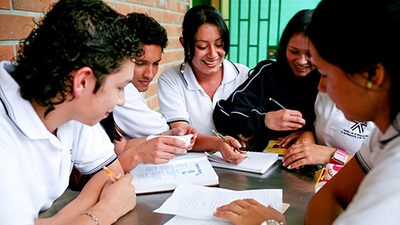Education: Sector Results Profile
World Bank Support to Education: Learning for All, Skills for Jobs

Education is fundamental to development and growth. From encouraging higher enrollment, especially for girls and other disadvantaged children, to promoting learning for all, the World Bank Group plays a significant role in education globally. Between 2000 and 2011, the total number of out-of-school children worldwide declined from 102 million to 61 million. Yet, considerable work remains to be done to help ensure that children are able to complete primary school and develop the skills they need for life and work. The World Bank Group is working with partners nationally and globally to achieve these and many other education-related aims.
61 million
Between 2000 and 2011, the total number of out-of-school children worldwide declined from 102 million to 61 million.
CHALLENGE
To improve learning involves reforms and interventions in various parts of an education system. Key is the need to systematically measure learning and use learning results to improve classroom practices and hold educators accountable.
Major challenges in access to a meaningful education remain for the most disadvantaged populations, and there is a need to increase financing to close these gaps and to improve the quality of service provision through better policies and stronger institutions.
Countries have made important gains on the education MDG targets. Gender parity in primary and secondary enrollment reached nearly 97 percent in 2010 and primary school completion rates reached over 90 percent in 2011. Yet more than 60 million primary school-age children are still out of school. Estimates show that about three quarters of them live in countries afflicted by violence; regionally, more than half of them live in Africa and more than a fifth live in South Asia. Additionally, to varying degrees, educational progress has lagged because of indigenous, low-income, gender, or disability status in nearly all countries.
SOLUTION
The World Bank is one of the largest external education financiers for developing countries, managing a portfolio of US$9 billion, with operations in 71 countries as of January 2013. The World Bank helps countries achieve their education goals through finance and knowledge services in the form of analytic work, policy advice, and technical assistance. This support includes working with countries to help identify the role and contribution of education to their overall development strategies. It also means understanding countries’ priorities, needs, and constraints, and jointly designing programs in response, while collaborating with other donors. As part of its long-standing support to countries for education, the Bank unveiled its “Learning for All” education strategy, and introduced the Systems Approach for Better Education Results (SABER), an important initiative that helps countries assess their education system performance and map ways to improve.
Education Strategy. In 2011, the World Bank launched the Education Sector Strategy 2020, entitled “Learning for All: Investing in People’s Knowledge and Skills to Promote Development.” The strategy recognizes that learning drives development and encourages countries to invest early (because foundational skills acquired early benefit lifelong learning), smartly (in efforts proven to improve learning), and for all (focusing on all students and ensuring equity). To achieve learning for all, the Bank is promoting country-level reforms of education systems, and building a global knowledge base to guide reform.
Systems Approach for Better Education Results (SABER). SABER helps countries move toward learning for all through tools that assess education system performance and help guide reform. It fills a critical gap in worldwide policy data and knowledge on what matters most in improving education quality. The World Bank is working with
